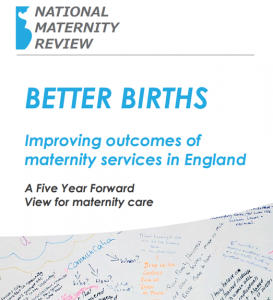A blog post from #MatExp founder Florence Wilcock.
Remember #Flaming June? This time last year we asked you to wake up, light the fires and take action to improve maternity experience. We gave you a template and asked you to share your action selfies with us. There were many resulting actions spilling out in all directions & across many geographical areas, some big and some small, some simple and completed, some complex and ongoing. Major highs were the birth of this wonderful MatExp.org.uk website and founding of the MatExp Facebook group. This June will I’m sure be no less exciting. From my own perspective I am taking a #MatExp poster to the RCOG world congress, we are hosting a stand & speaking at the London labour ward leads meeting, and of course we are in the middle of our new project ‘Nobody’s patient’ MatExp 2. I know there are two #MatExp Whose Shoes? workshops planned in June: Homerton & Colchester, the latest Trusts to jump on board, following fast in the footsteps of Cumbria last week. #MatExp certainly never stops moving and I know many of you are busy at work on numerous actions in all sorts of directions. Fabulous stuff!
I have written a few reflective blogs in the past to look back and take stock of what we have achieved since #MatExp started in October 2014, but for a change this time to mark the anniversary of #FlamingJune, I thought I would instead focus on the future. So here goes!
Flaming June 2017! My hopes:
A year is not long in terms of institutional change especially one as large as the NHS. My hope is that by next June we will have developed robust foundations with which to undertake the work to implement the National Maternity review five-year transformation. The NHS England Maternity Transformation board will be up and running, having fully embraced genuine co-design so that women are driving & leading the national changes in maternity services. Women will be embedded top to bottom or rather as I prefer bottom to top, through involvement at all levels via MSLC, MatExp, & other local and national groups. The seven personalisation maternity vanguards will role-model collaborative working with women and families. NHS England will support and strengthen this approach by encouraging sharing of best practice and ideas, linking those areas where women’s leadership and involvement is already embedded with those areas where there is more to do. The transformation board will be promoting cross boundary working across disciplines & geographies with much more emphasis on the need to share good practice so that this is becoming expected routine practice. Every organisation involved in delivery of maternity care will be expected to have a Maternity champion on the board. The National maternity transformation board will support these champions gathering them together to exchange ideas and encourage shared vision and purpose twice yearly.
For a true transformation to occur bravery will be essential. So I hope in a year we will be developing collective bravery. Professionals will need to be brave enough to let go of organisational institutional anxiety, we will need to be thinking about working very differently and we need to acknowledge this will be very difficult for some of us. We will need to support one another and openly listen to those anxieties and difficulties so that we don’t leave people behind. We need to retain quality whilst undergoing transformation, keeping the essentials of safety & experience stable on a background of turbulence. We need to be brave enough to fail. We will need to plan and test innovative co-designed solutions and we will need to learn from this what works and what doesn’t, modify and try again. We need to value and support one another whilst being brave enough to take the opportunity to transform care. If we do this collectively we will be successful.
A key part of the transformation planning will be to focus on individualised care for all women. Women with pre-existing conditions or obstetric complications in pregnancy will not be marginalised or feel discriminated against by the focus on continuity & personalisation. Their need for midwifery support is just as great and they should not be medicalised. Alongside the transformation board, the national programme of improvement of perinatal mental health will be a step closer to being properly funded, with appropriate care provision planned in all areas so that the current postcode lottery is coming to an end. My hope is that maternity and mental health leaders have become well integrated through the regional networks, establishing relationships so that there is more joined-up thinking, treating women and families holistically rather than separating mind and body.
In a year, the Department of Health will have finished a review of funding, recognising the fundamental need for obstetric care, neonatal units, intensive care etc. which carry fixed costs and need properly funding. These costs must not be destabilised by the desire to move to a more community based MDT approach. The DH will have created a viable plan as to how the tariff will work to support the transformation and provided adequate funding for the changes to be sustainable.
To achieve these aims by next June is going to take collective purpose and compassionate leadership. By leadership, I do not just mean those traditional leaders at the top of organisations and departments; everyone has a role to play. Healthcare professionals can recognise and support those who are finding this difficult as well as encourage and enthuse those that are ready for change. How aware are we as a workforce of the changes that are coming? How involved do we feel in shaping those changes? Having those conversations in hospitals, in community clinics on a daily basis will help people see the vision and feel they can help shape the changes. Transformation will become an opportunity and part of our jobs, not a threat externally imposed.
Women and families also have a key role in helping and supporting professionals though conversations either one-on-one or at more formal forums, MSLC, birth forums, maternity networks and so on. When women ask for things staff usually respond, so women have a key role not only in shaping the changes but in supporting and encouraging those trying to implement them. We have already seen this approach work in many ways in #MatExp, women asking for skin-to-skin in theatre or optimal cord clamping are two simple examples.
The National Maternity review itself outlines the need for individual responsibility by both healthcare professionals and the women and families in shaping the future, calling for a grassroots movement to improve maternity care. We are that movement; in a year I want to continue to see #MatExp grow and thrive. We need to continue as individuals taking those little steps and actions every day. Together we can own this change.




